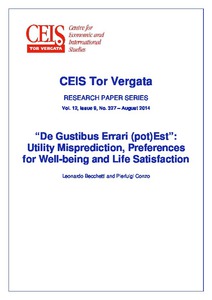"De gustibus errari (pot)est": utility misprediction, preferences for well-being and life satisfaction
"The life satisfaction literature generally focuses on how life events affect subjective well-being. Through a contingent valuation survey we test whether well-being preferences have significant impact on life satisfaction. A sample of respondents is asked to simulate a policymaker decision con...
| Main Authors: | , |
|---|---|
| Institution: | ETUI-European Trade Union Institute |
| Format: | TEXT |
| Language: | English |
| Published: |
Rome
2014
University of Rome Tor Vergata |
| Subjects: | |
| Online Access: | https://www.labourline.org/KENTIKA-19116265124919344479-De-gustibus-errari-(pot)est-ut.htm |
| Summary: | "The life satisfaction literature generally focuses on how life events affect subjective well-being. Through a contingent valuation survey we test whether well-being preferences have significant impact on life satisfaction. A sample of respondents is asked to simulate a policymaker decision consisting in allocating scarce financial resources among 11 well-being domains. Consistently with the utility misprediction hypothesis, we find that the willingness to invest more in the economic well-being domain is negatively correlated with life satisfaction. Our findings are shown to be robust when we account for unobservables related to economic fragility and non-random sample selection. Revers e causality and omitted variable bias are controlled for with instrumental variables and a sensitivity analysis on departures from exogeneity assumptions. Subsample estimates document that the less educated are more affected by the problem." |
|---|---|
| Physical Description: | 40 p. Digital |

